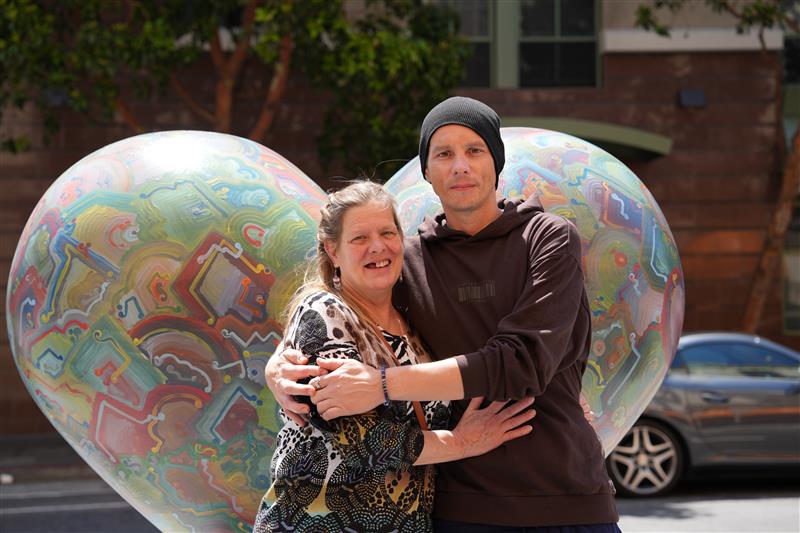
Tami with her son Anthony outside of Glide Memorial Church
When Tami stepped off a train into San Francisco three years ago, she carried almost nothing—just the clothes on her back—and a quiet determination that things had to change. Her arrival was the culmination of years spent surviving on the margins: childhood loss, decades of addiction, and life in a dangerous riverbed outside Madera County. What followed was not a sudden miracle but a slow, stubborn rebuilding—shelter, treatment, community, and the steady work of reclaiming a life.
Tami’s childhood was marked by devastating loss. “My childhood was very unstable—my mother was murdered when I was seven. My brother and I found her lifeless body after returning from the corner store. By the time I was eleven, my father had left us.”
The siblings entered Oregon’s foster-care system and, according to Tami, moved through more than 150 foster homes and/or shelters before she aged out at eighteen. Despite that instability, she finished high school and became a young mother to now three grown sons.
As an adult, Tami struggled with drug abuse, in particular, methamphetamines. It led to repeated homelessness. For years she lived in a riverbed with her partner and others—a place with no services, constant danger, and few options for help. The assault she experienced there became the brutal turning point in her life. Raped by four men, Tami knew she could no longer protect herself. “I needed help. I had to get away,” she says. That crisis—along with encouragement from others and, later, a train ticket a counselor gave her—led her to San Francisco.
Her first stop in the city was HealthRight 360 (a Walden House program), where she entered drug treatment and completed the program. From there she moved into a step-down placement and kept looking for support. GLIDE emerged as a lifeline: a free meal became a doorway into community. She spent time at the Women’s Center, began making friendships, and slowly relearned how to be part of a community that did not revolve around survival on the streets.
Work prospects soon followed through Glide’s network. She lives a couple of blocks away at a local Salvation Army residence. The job would be modest but meaningful: routine, purpose, and the dignity of contributing.
Faith and education are central to Tami’s recovery. She speaks of finding God later in life—an experience that reshaped how she sees herself and her future. She also completed Episcopal Community Services’ (ECS) case-management program (Reach Program, Cohort 18) and is working to convert that training into college credits, with an eye toward a bachelor’s degree someday.
A new chapter is also unfolding: Tami’s 40-year-old son, Anthony, who arrived in San Francisco recently after serving time in jail. He has entered treatment at HealthRight 360. “We’ll both be at Celebration services at Glide Memorial Church on Sunday,” she says, voice bright with hope. The counselor who once gave her a train ticket helped start a cycle of care that is now, improbably, bringing mother and son together in recovery.
Tami’s story is not a tidy redemption tale. It is a history of grief endured, harm suffered, help accepted, and slow, steady rebuilding. Clinics and nonprofits provided pathways out; a contractor offered work; a counselor handed her a ticket. “I received help when I needed it. I also found faith in God and Jesus, which has changed my understanding about my life.”
Tami’s persistence has carried her forward. She now tells everyone she meets about the assistance that enabled her to make the changes necessary in her life to begin living again. “If GLIDE helped me, it can help anyone.”
